What is Neurodiversity?
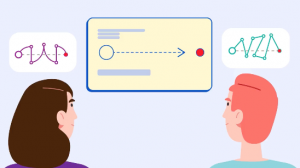 NEW – Neurodiversity at Work aims to help create inclusive workplaces.
NEW – Neurodiversity at Work aims to help create inclusive workplaces.
But what exactly is “neurodiversity”?
Watch our explainer video and find out! For more information about the project visit our website
![]()
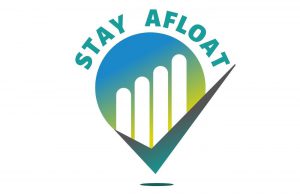 Stay afloat has entered its piloting phase.
Stay afloat has entered its piloting phase.
If you want to find out more about our online course for start-up entrepreneurs, go to this page.
![]()
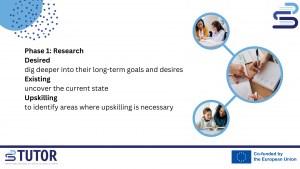 The initial phase, “Research,” is structured into three steps: “Desired,” “Existing,” and “Upskilling,” all aimed at gathering comprehensive insights into requirements for inclusion in schools.
The initial phase, “Research,” is structured into three steps: “Desired,” “Existing,” and “Upskilling,” all aimed at gathering comprehensive insights into requirements for inclusion in schools.
Desired Insights: We took a look at the ambitions educators hold for inclusive teaching and tried to delve deeper into their long-term goals and desires, exploring their vision for creating an inclusive educational environment.
Existing State: We did further research to uncover the current state of affairs for both teachers and students, seeking to understand their perspectives of inclusive education what they consider important, and their current skills teaching.
Upskilling: At the moment, we are evaluating educators’ readiness to upskill in inclusive teaching and their attitudes toward inclusion. Therefore, we want to identify areas where further improvement is necessary.
To gather this vital information, we conducted diverse research activities: Desk Research, Focus Groups, Interviews, Consultation Talks and Online Surveys. How exactly we did this you can read in our next Post
If you want to know more you can check out our website


The MINDSET project wants to prepare youth organisations and youth workers to identify the early signs and prevent the development of gaming disorder among youth. Considering the reality involving gaming disorder, MINDSET has the following main objectives:
– Raise awareness about the negative eects of excessive gaming;
– Provide youth workers and youth organizations with the knowledge to recognise the signs of gaming disorder, distinguishing it from normal gaming behaviour;
– Equip youth workers with the tools to identify early signs and prevent gaming disorder;
– Promote the development of new policies for the identication and prevention of gaming disorder.
In order to achieve these objectives, the MINDSET project foresees the development and implementation of the following project results:
– A Handbook on Gaming Disorder for youth
– An Organisational change guide for youth organisations
– A Capacity Building Program and toolkit for youth workers
– A Self-Evaluation Questionnaire for youth – An Assessment questionnaire for youth workers
– Several Action Sheets
– An Experience Roadmap
– Policy Recommendations
– A Joint Staff Training
– A Publication “Preventing the Prevalence of Gaming Disorder Among Youth
Make sure to follow the MINDSET project, its development and implementation on our social media platforms:
LinkedIn: https://www.linkedin.com/
Facebook: https://www.facebook.com/
MOVE-UP initiative aims to improve outreach to potential adult learners in Europe and support participation in upskilling pathways
Our new EU-funded MOVE-UP project is developing a flexible and quality upskilling pathway for unemployed women who are dedicating most of their time and efforts to the role of mother and who are in need to (re) join education activities and the job market.
One of the focus of the consortium is also to improve outreach strategies and activities to positively and successfully engage with potential adult learners and improve their participation in upskilling pathways in a broader sense.
If you are interested in supporting adults to re-join education activities and to enhance Personal Social and Learning competences as well as basic skills (literacy, digital, financial etc.), we invite you to join us for our first MOVE-UP Alliance International Webinar on 16 November at 16.00 CET “Reaching out to adult learners: key success factor for upskilling pathways” to give us feedback on our outreach strategy and share your experiences and good practices on how to improve adult participation in education across Europe.
Webinar programme and registration are available on the MOVE-UP website.
For more information: Viola Pinzi – viola.pinzi@eaea.org
The MOtherhood Valorisation and Empowerment for professional development – Upskilling Pathways / MOVE-UP project is co-funded by the European Union. Views and opinions expressed are however those of the author(s) only and do not necessarily reflect those of the European Union or EACEA. Neither the European Union nor the granting authority can be held responsible for them.
![]()
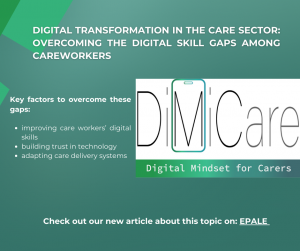 The digital age is transforming elderly and long-term care.
The digital age is transforming elderly and long-term care.
From smart homes to tele-care and robotics, technology is enhancing the quality of care.
To make it work, there are three important key factors to consider: improving care workers’ digital skills, building trust in technology, and adapting care delivery systems.
The DiMiCare project is our initiative to enhance care assistants’ digital competencies.
Read our newly published article on EPALE to find out more about important measures for a successful implementation of digital technology in care and gain insights into how DiMiCare is addressing this challenge.
![]()
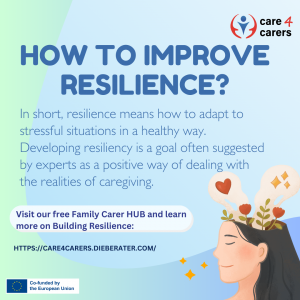 Do you know what resilience means? Do you know why it’s so important for you?
Do you know what resilience means? Do you know why it’s so important for you?
Resilience means learning how to adapt to stressful situations in a healthy way! Experts view this as a positive way of dealing with difficulties, especially when providing caregiving.
Visit our Family Carer HUB and learn more about building resilience!
Our website.
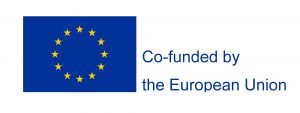

Curious about the latest updates on our DEQF Project?
🌟 Look no further!
Check out our newsletter for information and updates on the project.

 Are you looking for a new job?
Are you looking for a new job?
We have some tips and tricks to make it easier for you!
In our previous postings about our latest modules, you had the chance to learn how to validate and recognize your skills.
Now, we want to present you 4 tips for landing your next job.
If you want to know more about job orientation and job search, you can check out our free online modules on our website.

Are you aware that… Carers acquire a lot of transferable skills through their caregiving experiences.
Are you interested in discovering the right way to acknowledge and authenticate these acquired skills?
Explore our upcoming module: Recognizing and Validating Acquired Skills.
In this module, we’ll explore not just the process of skill acquisition but also the techniques for accurately identifying and validating these skills. If you’re curious to learn more, be sure to visit our website.
